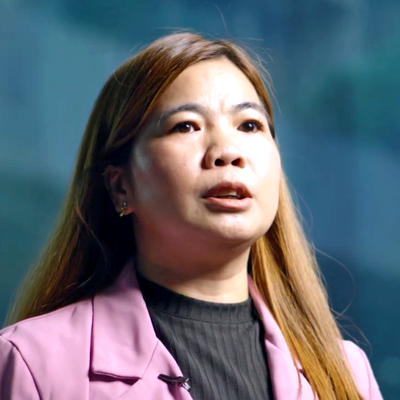OVERVIEW
About This Programme

The Master of Science in Financial Technology combines cutting-edge technology with financial expertise to equip students with the skills required to navigate the evolving financial landscape. The programme covers key areas such as digital leadership, programming fundamentals, risk management, and financial strategy, preparing graduates to lead innovation in the financial sector.
Through a blend of theoretical knowledge and practical applications, students will gain insights into emerging technologies, financial regulations, and business transformation strategies. Upon completion, the MSc degree will be awarded by Manchester Metropolitan University.
Complete in 12 months | Fast track degree
Triple-accredited – Top 1% globally reflects high standards of teaching & research
Ranked Top 20% Globally Times Higher Education Young University Rankings 2023

MODULES
Designed to explore beyond subject knowledge
The Master of Science in Financial Technology offers a dynamic curriculum that bridges finance and technology, empowering students to address contemporary challenges in the financial sector. Key modules, such as Innovations in Technology, Business Model Innovation and FinTech, and Risk Management for Financial Institutions, provide a deep understanding of financial technologies and their impact on business models and risk management.
Graduates will develop practical expertise in Fundamentals of Programming, Digital Leadership Transformation, and financial strategy while honing their research abilities through the Extended Research Proposal and Dissertation modules. The programme ensures graduates are equipped with the technical, analytical, and leadership skills required for successful careers in financial technology and innovation.
Masters Level Learning
This module introduces students to postgraduate study, focusing on converting diverse prior educational and professional experiences into the tools and skills needed for academic success. It promotes critical thinking and writing through varied learning approaches, ensuring students feel confident in engaging with their postgraduate qualification in accounting, finance, and banking.
Innovations in Technology
This module provides a grounding in financial technologies and their expanding role within the financial sector. Students will critically examine both the disruptive impact and inherent risks of these innovations while gaining insights into their practical applications. While some financial technologies have gained widespread recognition, their rapid market integration and influence remain unprecedented. By exploring real-world developments and applications, students will develop a deeper understanding of how these innovations are shaping, merging with, and in some cases, replacing traditional financial activities.
The module focuses on four key areas:
Blockchain Technology, Smart Contracts & Cryptocurrencies
Machine Learning, Big Data & High-Performance Computing
Algorithmic Investing & Robo-Advisory
IT Security, Privacy & Cyber Threats
Financial Strategy, Regulation and Avoidance of Business Failure
This module examines financial risk and regulation through a case study-based approach, analysing historical examples of corporate and market failures. Emphasis is placed on the macroeconomic context, financial strategy, behavioural finance, and corporate reporting decisions that contributed to these failures, as well as lessons learned.
The module explores cases ranging from entrepreneurial owner-manager businesses to multinational organisations. Students will identify modern risks faced by organisations and develop strategies to monitor and mitigate these risks, ensuring corporate stability and avoiding business failure.
Digital Leadership Transformation
This module develops the strategic thinking and leadership skills necessary for managing the role of digital technologies in organisational success and transformation. It focuses on key areas such as strategic planning, business leadership, change management, organisational learning, knowledge management, entrepreneurship, and innovation.
Students will explore the complex interplay between technological, operational, and business drivers in digital transformation projects. The module addresses the contemporary significance of digital business transformation, equipping students to become effective leaders in this critical area.
Business Model Innovation and FinTech
This module explores the theory and practice of innovation and digital disruption within financial services and processes. It examines the concept of disruption beyond buzzwords, analysing its real-world impact through case studies of transformative businesses and activities. Students will engage with cutting-edge research and practical examples to understand how innovative business models and FinTech solutions reshape financial industries.
Fundamentals of Programming
This module provides a grounding in information technologies and programming concepts that underpin contemporary business applications. Students will learn key programming constructs, including variables, data types, decision and looping structures, basic algorithms, arrays, structured programming, and code reuse, with a focus on practical applications using languages such as Python.
The module examines the transformative and disruptive potential of emerging technologies and programming paradigms. Through real-life examples, students will explore how these innovations are reshaping and replacing traditional business practices, providing valuable insights into the evolving role of technology in modern industries.
Finance for Managers
This module introduces the basic theories, concepts, and applications of financial accounting, management accounting, and finance within modern organisations. While students are not expected to master specific financial tools and techniques, they will develop an understanding of how financial professionals collaborate with other management functions to support and achieve organisational strategic objectives. The module is designed to equip aspiring middle managers with the financial literacy needed to contribute effectively to organisational success.
Risk Management for Financial Institutions
This module examines the critical aspects of risk management in financial institutions, emphasising the challenges posed by traditional activities and the evolving nature of product and service offerings. It provides insights into managing risk at commercial and investment banks, investment managers, financial regulators, and depositories.
Students will explore the varying requirements of stakeholders and reflect on how these demands are balanced in practice. The module addresses the heightened scrutiny and evolving expectations surrounding risk management, offering a comprehensive understanding of its role in financial institutions.
Extended Research Proposal
This module enables students to identify, structure, and investigate a complex managerial or business issue, culminating in the creation of an individual research proposal. The proposal includes a justification of the research context, clear research objectives, a review of relevant literature, and a detailed research methodology and design.
Students will engage in independent research on a topic of their interest, supported by a dedicated dissertation supervisor and workshops. This module provides an opportunity to explore areas such as social responsibility practices or dividend decisions, aligning research with personal interests or future career goals. Students will develop critical skills in research design and analysis, preparing them for the subsequent dissertation and graduate positions.
Dissertation
This module requires students to investigate a complex managerial or business issue, collecting and analysing data to produce a substantial written document detailing their findings and conclusions. Building on the research developed in the Extended Research Proposal module, this unit provides an opportunity for in-depth independent study.
Students will explore topics that interest and challenge them, such as social responsibility practices or dividend decisions, with guidance from a dedicated dissertation supervisor and access to workshops. This module fosters critical research and analytical skills, empowering students to apply their learning to real-world issues and preparing them for advanced graduate roles.
Full programme structure and learning outcomes
Get details and learn about the advantages of learning with LSBF.
what to expect
Advance Your Career in FinTech
Programme Aims
- Analyse the range of management and leadership tools and techniques available to senior leaders, and their practical application in resolving issues, determining long-term plans, and structuring organisational activities.
- Critically evaluate current developments in financial and other technologies and their implications for organisational operations and strategy.
- Explore and critically assess the theory and practice of innovation and digital disruption within the financial services sector.
- Apply critical thinking and research-informed approaches to advance knowledge and understanding of FinTech and its practical applications.
Learning Outcomes
Knowledge and Critical Understanding
- Analyse the range of management and leadership tools and techniques available to senior leaders, and their practical application in resolving issues, structuring organisational activities, and planning long-term strategies.
- Critically evaluate current developments in financial and other technologies and their impact on organisational operations and activities.
- Examine the theory and practice of innovation and digital disruption within the financial services sector.
- Utilise research-informed approaches to advance knowledge and understanding of FinTech and its practical applications.
Skills and Attributes
- Apply critical thinking to address practical and theoretical problems effectively.
- Communicate ideas and findings using a range of media.
- Demonstrate awareness of ethical, corporate social responsibility, and sustainability issues relevant to the discipline context.
- Exhibit professional and commercial awareness in FinTech and related fields.
Skills you will acquire

programme structure
Assessment, Graduation and Award
| Modules | Credits | Face to Face Teaching Contact Hours | Independent Study Hours | Total Hours per module |
| Masters Level Learning | 15 | 36 | 114 | 150 |
| Innovations in Technology | 15 | 36 | 114 | 150 |
| Financial Strategy, Regulation and Avoidance of Business Failure | 15 | 36 | 114 | 150 |
| Digital Leadership Transformation | 15 | 36 | 114 | 150 |
| Business Model Innovation and FinTech | 15 | 36 | 114 | 150 |
| Fundamentals of Programming | 15 | 36 | 114 | 150 |
| Finance for Managers | 15 | 36 | 114 | 150 |
| Risk Management For Financial Institutions | 15 | 36 | 114 | 150 |
| Extended Research Proposal | 30 | 12 | 288 | 300 |
| Dissertation | 30 | 12 | 288 | 300 |
| Total hours | 312 | 1488 | 1800 | |
Upon successful completion of 180 credits at this level, the exit award shall be: MSc Financial Technology.
Upon successful completion of 120 credits at this level, the interim exit award shall be: PGDip Financial Technology.
Upon successful completion of 60 credits at this level, the interim exit award shall be: PGCert Financial Technology.
Teacher student ratio
1:100
STUDENT SUPPORT SERVICES
Why choose LSBF for your education
Study Materials
Students will receive study materials after they have made full payment for their programme. Replacement of study materials is subject to additional charge.
Student Portal
Students have access to the Student Portal. It is a useful site where the course information and learning materials are available for students’ easy reference.
Accessible Faculty
Students may contact their lecturers directly via email outside the lecture hours for any academic related queries.
Recorded Lectures
We will show compassion and care to all stakeholders as we believe the journey is as important as the outcome.
ELIGIBILITY
Who can apply
Minimum Academic Entry Requirement
Students who have successfully completed either of the following:
- Bachelor’s degree with minimum GPA of 2.7/4.0 or 3.5/5.0, or equivalent.
- Students, who have obtained equivalent qualifications in relevant fields, or mature candidates who do not meet the standard entry requirements, will be assessed on a case-by-case basis and subject to university approval.
Minimum English Language Entry Requirement
- IELTS 6.5 overall with no component below 5.5 or
- Singapore GCE O Level, with a grade of C or above, or equivalent.
Minimum Age
18 years or above
TUITION FEES (GST Inclusive)
$ 18,203.00
(local students)
$ 22,890.00
(international students)
FAQs
Is this programme eligible for SkillsFuture (SSG) or Post-Secondary Education Account (PSEA) funding?
SkillsFuture (SSG) and Post-Secondary Education Account (PSEA) funding are currently applicable only to selected programmes offered by public institutions such as NUS, NTU, and SMU. While this programme is not covered under those schemes, we’re pleased to offer exclusive rebates and promotional rates. To learn more about the available fee support and eligibility, please contact our Education Consultants at +65 6580 7700 or get in touch here.
What career opportunities are available after this degree?
Graduates can move into roles such as fintech product manager, blockchain analyst, digital banking strategist, or data-driven financial consultant.
What can I study after this degree?
Consider advanced certifications in blockchain, AI for finance, or data science to further specialise.
What if I’m unsure about staying in fintech?
That’s alright. Your blend of finance and tech knowledge can support career pivots into consulting, analytics, or innovation strategy roles.
How do I get started?
Reach out to our expert education consultants at +65 6580 7700 or visit us at 80 Robinson Road, #01-00, Singapore 068898. We’re here to help you plan your next step.





















